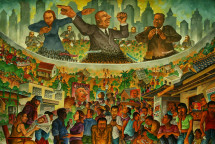The rural roots and consequences of authoritarian populism in Paraguay
Topics
Regions
Analysing the rural dimensions of authoritarian populism through the Paraguayan experience.

Authors
In Latin America, the term ‘populism’ is habitually associated with movements based in the urban working class, such as Peronism. However, a growing number of studies have extended their gaze to explore populism as a phenomenon in predominantly rural societies.
Dix (1985) concluded from his comparative study of authoritarian populism and democratic populism that one salient contrast between the two varieties of populism has been the nature and strength of their ties to peasants. Such ties have been far stronger both quantitatively and qualitatively for democratic populists, whose parties regularly depended far more on the campesino vote than have the authoritarian populists.
Contrary to Dix’s findings – which argue that authoritarian populist movements in Latin America ‘do not rely nearly as heavily on campesinos for electoral and organizational backing as do the democratic populists’ – it is maintained here that one of the strongest ties between a populist movement and a peasant constituency in Latin America can be found in case of dictatorial Paraguay under the Stroessner regime (1954 - 1989).
This paper was presented at the Emancipatory Rural Politics Initiative (ERPI) 2018 Conference: "Authoritarian Populism and the Rural World"